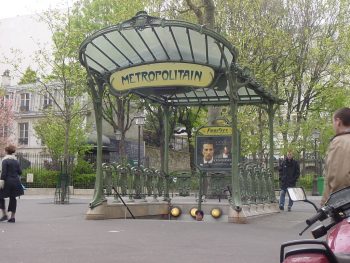Zazie dans le métro . . . et ailleurs !* Posted by Tim Hildreth on Jul 26, 2016 in Culture, Vocabulary
I finished a new livre (book) on vacation last week à la plage (at the beach).** Ok, it wasn’t new-new, but it was new to me. Zazie dans le métro (Zazie in the subway) is a 1959 novel by French author Raymond Queneau that was revolutionary in its use of language.
Zazie (a name created by Queneau) is a young girl on her first “adventure” in Paris with one goal in mind . . . to ride le métro (the Paris subway). Unfortunately for her, as the novel opens, le métro est fermé! (the subway is closed!) Eh oui!*** (Of course!) Le métro est fermé parce que les poinçonneurs sont en grèves ! (The subway is shut down because the ticket men are on strike !)****
As we follow Zazie and a curious band of Parisians through a series of strange adventures around mid-century Paris, Queneau deploys word play, words borrowed from other languages, and abandons many of the rules of written French spelling and grammar to reflect le langage familier et l’argot (common speech and slang) that was used by the average Parisians of the day. I admit it was a bit of a challenge at first, but once you adapt to the phonetic representation of common French expressions, you can follow what turns out to be a rather interesting (if admittedly at times confusing!) story.
In 1960, Zazie dans le métro was adapted into a feature film by the French réalisateur***** (director), Luis Malle in case you prefer your literature sur le grand écran (on the big screen).
This week’s word on vocabulary: la langue vs. le langage
French has two words for the English word “language”.
Le langage refers to the general idea of language – the concept, the constructs – that make up our ability as humans to communicate. Le langage peut être écrit ou parlé. (Language can be written or spoken.) Une langue on the other hand, is the thing we use to communicate . . . the specific language we read, write, and speak . . . Like English . . . or le français (note that in French you don’t capitalize the name of languages . . . only nationalities when speaking of people as a group “les Français”. But watch out, when you’re using it as an adjective to describe someone (elle est française/she is Fench; Pierre est français/Pierre is French) you don’t capitalize.
* … and elsewhere! Tune in next week to see where else Zazie turns up!
** I love vacations at the beach along the southern coast of Maine. Towns like Ogunquit, Maine with its rocky coast, grand hotels, and cliff-side walks remind me of the wonderful vacations I spent along la Manche (the English Channel) en Bretagne (in Brittany).
*** Eh oui! is a very common French interjection. Don’t confuse it with “et oui” (and yes) which you will see used in certain situations to reinforce a positive response to certain questions.
**** les poinçonneurs were responsable for checking passengers’ tickets on the metro and punching them with a small hole punch. The famous French singer Serge Gainsbourg famously sang about one from the Porte des Lilas métro station.
***** réalisateur is the term for a director on films. You may also encounter the expression metteur en scène which is also a director, but comes from the theater. The two terms are often used interchangeably when speaking of film.

Build vocabulary, practice pronunciation, and more with Transparent Language Online. Available anytime, anywhere, on any device.




